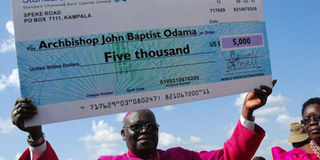For daring Kony, Odama bags peace award

Archbishop John Baptist Odama shows off his World Vision International peace prize to the crowd at Kaunda Grounds in Gulu Town on Thursday. Photo by Moses Akena
What you need to know:
Recognition. Receiving his World Vision peace prize for his role in the LRA peace talks, Archbishop John Baptist Odama wished he had done more then to save other lives.
Hundreds of people sang and danced at Kaunda Grounds in Gulu Town on Thursday as the peace ambassador, also Gulu Archbishop John Baptist Odama received an award for his efforts in ending the two-decade war that ravaged northern Uganda.
Tributes flowed as the archbishop officially received his World Vision International peace prize at a function attended by hundreds of people, most of whom he saved from the hands of the Lord’s Resistance Army rebels.
Archbishop Odama beat two others to win the prestigious award held annually in memory of Steve Williams, the former World Vision, United Kingdom senior policy advisor on peace and conflict.
Williams died unexpectedly from a heart failure in December 2007.
Six years later
The 65-year-old receives the award six years after the Juba peace talks concluded without any tangible outcome since Joseph Kony, the leader of the rebel outfit, refused to sign the final peace agreement, citing unmet grievances.
However, despite this, the region has experienced peace, with many already rebuilding their lives. World Vision’s director for peace building, Mathew Scot, said Odama’s win was a unanimous decision by the panel.
“We recognise organisations and people who made significant efforts for peace but are seldom recognised internationally,” Mr Scot said.
Aswa County MP Reagan Okumu recounted the different times they went with Archbishop Odama and other clerics to the bush to try and talk Kony into embracing peace talks.
“At one point, the President wanted to give us money to facilitate our travel but Archbishop Odama turned down the offer, unlike other people who demanded for money every time they went to the bush,” Mr Scot said.
Lino Owor Ogora, an official from the Justice and Reconciliation Project, who forwarded Odama’s name, congratulated him for the feat and urged him to continue working for peace.
Perhaps humbling, was the fact that the archbishop dedicated the award to the resilient population in northern Uganda. He also gave out the $5,000 cheque which accompanied the award, to the Acholi Education Initiative, which sponsors war affected children in the region.
“I accept this prize for peace in gratitude to God, World Vision and all who have made it possible,” Archbishop Odama said, before calling for an end to senseless wars world over.
Now in his 37th year in priesthood, Archbishop Odama spoke of the demanding ritual of self-dedication and called for continued peace talks to get Kony out of the jungles in Central African Republic, where the rebel leader is reported to be hiding.
To date, the archbishop still nostalgically remembers the peace talks, which he wants revived and regrets the way the conflict spread to neighbouring countries.
“The tribe of humanity must come together and solve this problem through talking and not though war. Because as we know, war has no child and never gave birth to any child and will never do so,” Odama said.
Asked what he thinks about the period during the war when he had a frosty relationship with the government and the LRA, which threatened to kill him, he said: “I was never a rebel collaborator, neither a supporter of the government but I was supporting the good of humanity in both of them. I was never bothered about it and it did not kill my resolve for peace.”
============================================
Quick takes
Service. Odama was made Archbishop of Gulu in 1999 from where he immediately joined the Acholi Religious Leaders’ Peace Initiative, which he led from 2002 to 2010.
People person. Archbishop Odama at one point refused to be guarded by the army at his home, as a way of identifying himself with the common man.
Regrets. His only regret in life, ironically, is that he feels he should have done more for the people of the north to end the conflict and save the children.
He says: “I felt I could have stayed firm to speak loudly and strongly on the signing of the peace agreement. I have also apologised to the children about thrice.”




